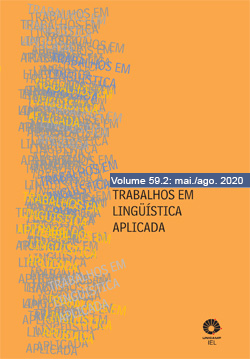Abstract
This paper aims to advance contemporary understandings of the semiotic potential of comments in interactions carried out on digital platforms. We do so by observing the online repercussion of a widely discussed case: the murder of city councilor Marielle Franco. Our analytical enterprise consists in discursively scrutinizing a stream of 1.600 comments, here understood as re-entextualizations of the story itself and as vestiges of its textual trajectory in varied contexts of circulation. The results shed light on the ways in which commentators contribute to the production, expansion and dispute of discourses which characterize the ideological polarization in the contemporary socio-political landscape.
References
AGHA, A. (2011). Meet mediatisation. Language & Communication, n. 31, pp. 163-170.
AMOSSY, Ruth. (2017). Apologia da polêmica. São Paulo: Contexto.
BAKHTIN, M. (1953). Os gêneros do discurso. In: Estética da criação verbal. São Paulo: Martins Fontes, 2003.
BAUMAN, R.; BRIGGS, C. L. (1990). Poetics and performance as critical perspectives on language and social life. Annual Review of Anthropology, v. 19, pp. 59-88.
BLOMMAERT, J. (2006). Social linguistics scales. London: Working Papers Urban Language & Literacies.
BLOMAERT, J. (2006). Language ideology. In: Brown, K. (org.) Encyclopedia of Language ans Linguistics. Oxford: Elsevier, pp. 510-52.
BLOMAERT, J. (2010). The sociolinguistics of globalization. Cambridge: Cambridge University Press.
BLOMMAERT, J.; JIE, D. (2019). Ethnographic Fieldwork: A Beginner’s Guide. Bristol: Multilingual Matters.
BRIGGS, C. (2007). Anthropology, interviewing, and communicability in contemporary Society. Current Abthropology, v. 48, n. 4., pp. 551-580.
CESARINO, L. (2019). On Digital Populism in Brazil. PoLAR: Political and Legal Anthropology Review. Disponível em: https://polarjournal.org/2019/04/15/on-jair-bolsonaros-digital-populism/. Acesso em: 20 fev. 2020.
FABRÍCIO, B. (2014). The pragmatics of entextualizing a digital ‘Lusophone’ territory. In: Moita Lopes, L.P. (org.). Global Portuguese: linguistic ideologies in Late Modernity. London: Routledge.
FOUCAULT, M. (1970). A ordem do discurso: aula inaugural no Collège de France, pronunciada em 2 de dezembro de 1970. Trad. Laura Fraga de Almeida Sampaio. São Paulo: Edições Loyola, 2012.
GOFFMAN, E. (1967). Interaction ritual. Garden City: Anchor Books.
GUMPERZ, J. (1982). Discourse strategies. Cambridge: Cambridge University Press.
BAUMGARTEN, N. et al. (2019) Towards balance and boundaries in public discourse : expressing and perceiving online hate speech (XPEROHS). RASK: International Journal of Language and Communication, v. 50, pp. 87-108.
OLIVEIRA, C. V. (no prelo). Polarização como prática comunicativa: O ataque pessoal no ambiente virtual. Tese de Doutorado em Estudos da Linguagem. Centro de Teologia e Ciências Humanas. PUC, Rio de Janeiro.
REAGLE JR, J. (2015). Reading the comments: likers, haters, and manipulators at the bottom of the web. Massachusetts: MIT Press.
SILVERSTEIN, M. (2003). Indexical order and the dialectics of sociolinguistic life. Language & Communication, v.23, pp.193-229.
SZABLA, M.; BLOMMAERT, J. (2017). Does context really collapse in social media. Plenary paper, conference on Moving Texts: Mediations and Transculturations. Plenary lecture at the conference on Moving Texts: Mediations and Transculturations. Universidade de Aveiro, Aveiro.
THOMPSON, J. B. (1995). The media and modernity: a social theory of media. Stanford: Stanford University Press.
O periódico Trabalhos em Linguística Aplicada utiliza a licença do Creative Commons (CC), preservando assim, a integridade dos artigos em ambiente de acesso aberto, em que:
- A publicação se reserva o direito de efetuar, nos originais, alterações de ordem normativa, ortográfica e gramatical, com vistas a manter o padrão culto da língua, respeitando, porém, o estilo dos autores;
- Os originais não serão devolvidos aos autores;
- Os autores mantêm os direitos totais sobre seus trabalhos publicados na Trabalhos de Linguística Aplicada, ficando sua reimpressão total ou parcial, depósito ou republicação sujeita à indicação de primeira publicação na revista, por meio da licença CC-BY;
- Deve ser consignada a fonte de publicação original;
- As opiniões emitidas pelos autores dos artigos são de sua exclusiva responsabilidade.


